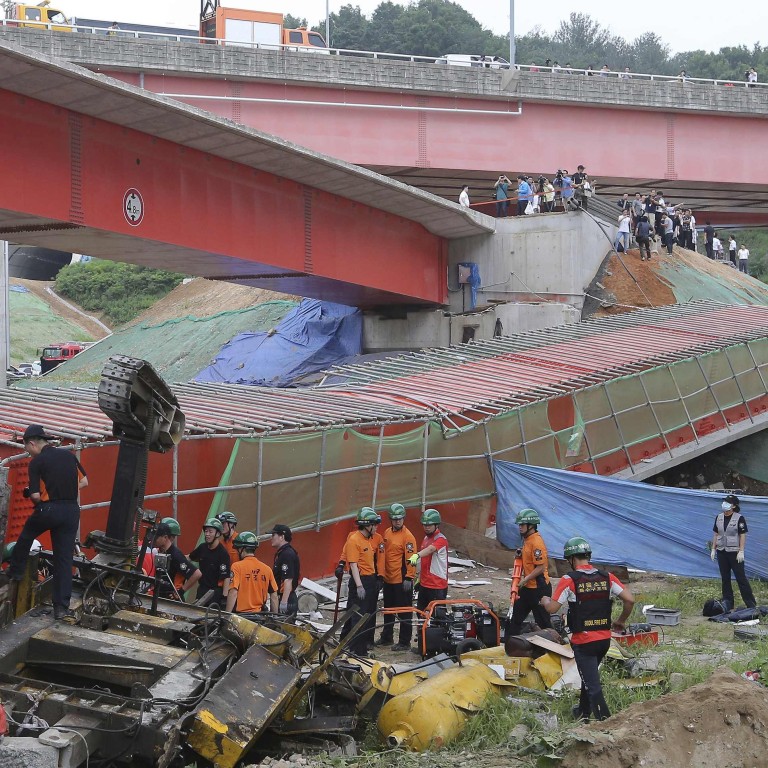
Industrial accidents in South Korea raise questions on treatment of Korean-Chinese migrant workers
A series of industrial accidents in South Korea last month that led to the death of ethnic Koreans with Chinese citizenship has raised concerns over the treatment of Korean-Chinese migrant workers in the country.
On Tuesday, Seoul police said two workers were crushed to death after a 47-metre steel structure and heavy equipment collapsed from an entrance ramp that was under construction at Seoul’s Banghwa bridge.
Another worker was wounded while the fourth remained unscathed.
All four labourers who were at the construction site at the time of the incident held Chinese nationality.
Just two weeks ago, seven workers – three of whom were Korean-Chinese – also died after being trapped in a flooded underground water distribution reservoir in Noryangjin.
Of the nine people who lost their lives in industrial accidents last month in Seoul, five were Chinese nationals.
Following the recent deaths, local media reported that Korean-Chinese labourers, who usually take dirty and dangerous jobs shunned by South Koreans, work in poor conditions without proper safety training because most are believed to be working illegally.
South Korea has been issuing H-2 working visitor visas to ethnic Koreans from China and the former Soviet Union countries since 2007 and around 230,000 H-2 visas had been issued as of June 2013.
H-2 visa holders are required to go through employment training approved by the labour ministry before seeking a job.
In reality, many overseas Koreans forgo this step to save money and time and decide to work illegally.
Neither the justice ministry nor the labour ministry has an official estimate of those who are working illegally in the country.
Construction industry insiders, meanwhile, estimated that their sector alone hires some 300,000 legal and illegal Korean-Chinese workers.
South Korean employers, they argued, still hired ethnic Koreans without work permits because their illegal status would prevent them from protesting against harsh working environments and demanding better treatment.
“Korean-Chinese labourers cost less and while South Korean labourers avoid difficult tasks, Korean-Chinese have a goal to earn money so they tend not to avoid arduous jobs,” explained Yoon Young-soon, the director of foreign workforce policy at the labour ministry, to news website News 1.
In addition, because most ethnic Korean construction labourers have no specialised knowledge, such as of electric power or civil engineering, they are relegated to the most dangerous tasks, which increases their exposure to industrial hazards.
The South Korean government has come under fire not only for its lack of oversight but also for its discriminatory policy when its comes to issuing visas for overseas Koreans.
Ethnic Koreans from China and the ex-Soviet Union automatically qualify for the H-2 visa, which allows them to work and stay in South Korea for a maximum of three years.
Yet overseas Koreans from industrialised countries, including the United States or Japan, can apply for an F-4 visa, which can be renewed every three years, as long as they show that at least one of their parents or grandparents have South Korean citizenship.
The F-4 visa application requirements for Korean-Chinese are more stringent.
They need to prove they have government-recognised licences for their skills, work at the management-level for a corporation or own a private business with sales of over US$100,000 (HK$775,596).
Experts suggested that Korean-Chinese migrant workers should be allowed to apply freely for the F-4 visa, which allows them to live and work in South Korea indefinitely.
Because Korean-Chinese have restrictive visas, or no documentation at all, they tend to take whatever jobs they can find to make as much money to send home.
An indefinite F-4 visa, however, could allow ethnic Koreans to look for more stable jobs and assert their rights, said experts.
